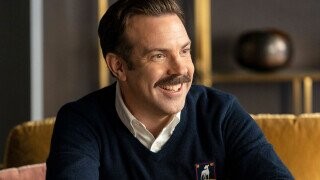How 'Ted Lasso' Reformulated The Sports Comedy

Welcome to ComedyNerd, Cracked's new deep dive series on tea and biscuits. Today's topic: Ted Lasso's re-mix of the sports comedy formula.
Season two of Ted Lasso came to an end this week, meaning that we'll have to wait quite a while before getting another dose of friendly, warm-hearted TV optimism that also doubles as a fictional showroom for Apple's newest products. But what is it that makes the show tick?
Obviously, Ted Lasso owes much to classic sports movies, but the end result is far different from your typical "Kevin Costner Has Alimony Payments to Make" baseball picture. Co-creator (and co-star) Brendan Hunt claimed in an interview that the goal of the show was to do the "sports movie thing" but "subvert some of the tropes." Although after two seasons, it doesn't seem like the show is subverting sports movie tropes so much as it is embracing them -- but also letting the same familiar tropes breathe and imbuing them with more emotional weight.
Don't Miss
This approach was underscored in the recent season finale; the revelation that Rebecca's repulsive ex-husband Rupert (who we have to remind ourselves is absolutely not Rupert Giles) purchased a rival football club -- and not only that, he has hired Nate to be one of the coaches, furthering that character's turn to the dark side. In doing so, the show has teed up a true staple of the '90s sports comedy: the evil rival coach. Because it's not enough for us, the audience, to simply want our heroes to win, the opposing team has to be run by complete garbage people whom we hate with a fiery passion.
But what would have been an extremely hacky plot development in season one actually works coming at the end of season two. Why? Because it was built up so gradually. The show even cultivated our contempt for Rupert in a narrative avenue completely separate from the actual competitive sports element of the story. And Nate's alienation and eventual betrayal took the better part of a season. As a contrast, take D2: the Mighty Ducks; we similarly get introduced to a villainous rival team, but it happens like 20 minutes into the movie. And in Ted Lasso, the reason why we hate these characters doesn't simply boil down to "they're Icelandic."
The show has continually employed a similar tactic throughout its run, adopting specific sports comedy tropes and, rather than brashly subverting them for the sole purpose of upending our expectations, the show simply allows the characters to behave like human beings within this familiar framework. Like Rebecca hiring Ted to bring down the team -- that's the clearly same premise as Major League. But playing out over ten hours with a character who isn't reduced to a misogynistic stereotype. Instead, Rebecca is able to come to the conclusion that her plan is a pretty shitty thing to do and was the result of unresolved pain from a traumatic divorce.
As co-creator Bill Lawrence commented: "even if you have what seems like a quintessential villain in Major League-style in the opening of a pilot, it's understandable that in a movie, that's all that character really has time for. In a series ... you can show other levels to that character, maybe even make them sympathetic." Similarly, Roy (the haggard veteran) getting together with Keeley, who's also been dating Jamie (the young talent), is pretty much the plot of Bull Durham. Ted Lasso doesn't really alter anything about this dynamic, but then the story continues, whereas Bull Durham just ends after an hour and forty-eight minutes every time.
Even the story of a mustachioed American taking a job in a foreign sports market is kind of familiar; is Ted Lasso just a less-racist remake of Mr. Baseball? Okay, that might be going too far. But the point is that what makes Ted Lasso work is that it's hitting these familiar beats, but taking its time to do so, and letting its characters inhabit the sports comedy universe in a way that the characters of, say, Necessary Roughness, never got to do.
You (yes, you) should follow JM on Twitter! And check out the podcast Rewatchability.
Top Image: Apple
